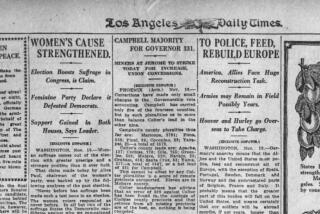Searching the Los Angeles Times website (1985 to the present)
Los Angeles Times subscribers have full access to articles on the Los Angeles Times website. This includes most articles published since 1985, as well as a smaller number of older articles. Search the site directly or through search engines. You can also browse by year and month on our historical sitemap .
Searching for printed articles and pages (1881 to the present)
Readers can search printed pages and article clips going back to 1881 in a database hosted by newspapers.com .
Are the archives free to all? No. Articles on the website are included in a Los Angeles Times subscription. Viewing the printed pages and clips at newspapers.com requires a fee.
How does newspapers.com work? Any reader can search newspapers.com by registering. There is a fee for seeing pages and other features. Papers from more than 30 days ago are available, all the way back to 1881.
What if I want to see a recent printed newspaper? Do the website and print formats provide the same information? No. The text of news articles will match in both formats, but other content can be different. For example, the digital website format does not include many print features, including weather pages, sports tables, stock prices and advertising, including paid obituaries. newspapers.com .
What’s the best way to search? You may want to try external search engines (include “latimes.com” in your search) as well as the Times site search. Search first by a phrase, keywords, dates, a snippet of text or author. Standard search techniques can help, such as putting an exact phrase in quotes.
What if I see more than one headline in a search? It is normal to see multiple news articles on one subject, since events unfold over time. Also, regional editions of the newspaper sometimes printed different versions of an article. In the early years of the internet it was common to publish an article on the website during the day, then separately publish an updated version the next morning on the website and in print. Searchers online may also find additional coverage in the form of digital photo galleries, blog posts, newsletters and other formats.
Are there other ways to find Los Angeles Times articles and photos? Yes. Vendors such as Lexis-Nexis and Dow Jones/Factiva license archive content to display in their databases. Syndicated versions of Times articles sometimes appear on other websites.
Where do I get research help? How can I buy an old newspaper, reprint an article or show a Times newspaper in a movie scene? Comments? Send a note to our reader’s representative . Use the general comments field and begin with “Archives:”

